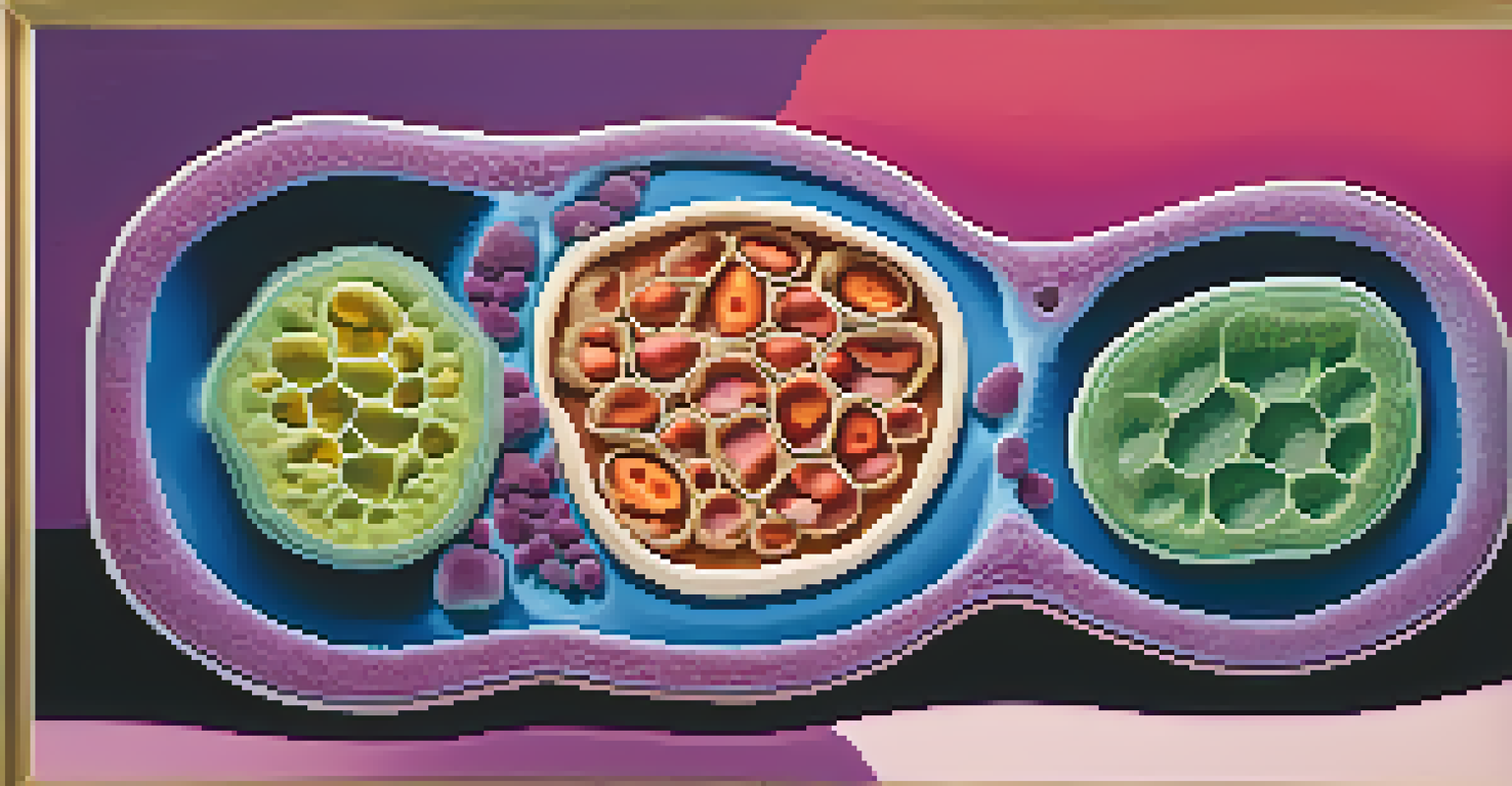The Importance of Calcium in Plant Structure and Growth

Calcium: The Unsung Hero of Plant Structure
Calcium plays a pivotal role in maintaining the structural integrity of plants. It acts as a building block for cell walls, helping to form and stabilize their structure. Without adequate calcium, plants can experience weak cell walls, leading to stunted growth and increased susceptibility to disease.
Calcium is the key to plant growth, as it serves as a foundation for the cellular structure and nutrient transport necessary for healthy development.
Think of calcium as the scaffolding of a building; it provides support and stability. Just as a building needs a solid foundation, plants require calcium for proper growth and development. This mineral is not just beneficial but essential for robust plant health.
Moreover, calcium is involved in the formation of calcium pectate, which binds cells together. This binding is crucial for tissue strength and overall plant resilience, making calcium an indispensable element in the plant kingdom.
Calcium's Role in Nutrient Uptake
Calcium is not just about structure; it also influences how plants absorb other nutrients. It helps regulate the uptake of essential minerals, ensuring plants get the nutrients they need to thrive. When calcium levels are low, nutrient absorption can be disrupted, leading to deficiencies.

Imagine trying to fill a glass with water but finding that the spout is blocked. That’s similar to what happens in plants when calcium is lacking; other nutrients are unable to flow freely into the plant. This blockage can result in various growth issues.
Calcium Strengthens Plant Structure
Calcium acts as a vital building block for cell walls, ensuring plants maintain their structural integrity and resilience.
Additionally, calcium aids in maintaining cell membrane stability, which is vital for nutrient transport within the plant. Healthy cell membranes lead to efficient nutrient uptake, showcasing calcium's multifaceted role in plant nutrition.
Calcium and Cell Division
Cell division is a critical process for plant growth, and calcium is integral to this process. It is involved in the formation of the cell plate during mitosis, which ultimately leads to new cell walls. Without sufficient calcium, cell division can be impaired, stunting growth.
Just as strong roots are essential for a tree, calcium is vital for the structural integrity of plants, supporting resilience against environmental stress.
Picture a factory assembly line where new products are continuously being made. If one part of the line is malfunctioning, the entire process is affected. In plants, inadequate calcium disrupts the 'production' of new cells, hindering overall development.
Furthermore, calcium contributes to the signaling mechanisms that trigger cell division. This signaling ensures that cells divide at the appropriate times, allowing for balanced and healthy growth patterns.
Calcium and Stress Tolerance in Plants
Plants face various environmental stresses, from drought to disease, and calcium helps them cope. It strengthens cell walls, making plants more resilient to physical stress and reducing the likelihood of damage. This fortification is crucial for survival in challenging conditions.
Imagine a tree standing strong against a fierce wind; its sturdy trunk and branches are a result of adequate calcium. In the same way, calcium enhances a plant's ability to withstand stressors, promoting longevity and vitality.
Calcium Aids Nutrient Uptake
By regulating the absorption of essential minerals, calcium plays a crucial role in ensuring plants receive the nutrients they need to thrive.
Moreover, calcium plays a role in signaling responses to stress. When plants detect stress, calcium levels fluctuate, activating defense mechanisms that help them adapt and survive. This ability to respond effectively underscores the importance of calcium in promoting plant health.
Calcium Deficiency: Symptoms and Solutions
Calcium deficiency can manifest in several ways, and recognizing the symptoms is crucial for plant care. Common signs include blossom end rot in tomatoes, tip burn in lettuce, and overall weak growth. Identifying these symptoms early can prevent further damage.
Think of calcium deficiency like a slow leak in a tire; it may not be immediately noticeable, but it can lead to bigger problems. If left unaddressed, the health of the plant can deteriorate rapidly, affecting yield and quality.
To remedy calcium deficiency, consider soil amendments like lime or gypsum. Regular soil testing can also help monitor calcium levels, ensuring your plants receive the necessary nutrients for optimal growth.
Calcium Sources for Plants
There are several sources of calcium available to plants, both natural and synthetic. Gypsum is a popular choice among gardeners, as it provides calcium without altering soil pH. Additionally, lime can be applied to improve calcium levels while also raising soil alkalinity.
Consider calcium-rich organic materials like crushed eggshells or bone meal, which can be added to compost. These natural amendments not only boost calcium but also enhance soil health over time, creating a thriving environment for plants.
Calcium Enhances Stress Tolerance
Calcium fortifies cell walls and triggers stress response mechanisms, helping plants withstand environmental challenges effectively.
It's essential to choose the right source based on your soil type and pH. A soil test can guide you in selecting the most effective calcium source, ensuring your plants receive what they need for robust growth.
The Future of Calcium Research in Agriculture
As agriculture evolves, the research surrounding calcium continues to grow. Scientists are exploring innovative ways to enhance calcium uptake in plants, which could lead to improved crop yields and resilience. This research is vital in addressing global food security challenges.
Think of this research as a treasure hunt; with every discovery, we uncover new ways to support plant health and productivity. By understanding calcium's role more deeply, we can develop strategies that maximize its benefits in agriculture.

Moreover, advancements in technology, such as precision agriculture, are allowing farmers to monitor calcium levels more effectively. This targeted approach ensures that plants receive the right amount of calcium, paving the way for healthier crops and sustainable farming practices.